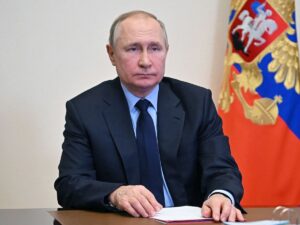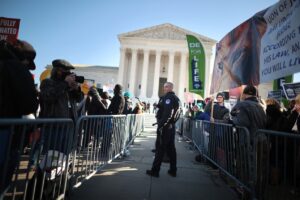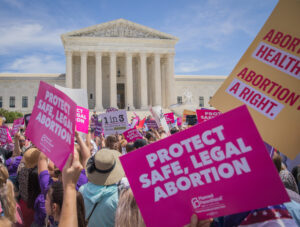Last Friday, mayoral candidate Maya Wiley held a news conference to blast Gov. Andrew Cuomo for what she deemed were ethical lapses — including reports he’d improperly pressured staff to help on his book “American Crisis.”
She promised that as mayor, she’d run an honest, transparent administration. She did not mention — or eagerly discuss when reporters inquired — another ethics issue: her proximity to the conflict-of-interest scandals that tarnished Mayor Bill de Blasio’s tenure at City Hall.
As the mayor’s first general counsel, or in-house lawyer, Wiley drafted a memo advising him on how he could legally solicit donations for a nonprofit he’d formed called Campaign for One New York (CONY) without violating conflict-of-interest rules. De Blasio nevertheless wound up the target of federal, state and local ethics investigations.
Federal prosecutors declined to bring criminal charges, but determined that de Blasio had intervened on behalf of donors with business before the city.
The state Joint Commission on Public Ethics (JCOPE) cited several donors for providing illegal gifts to the mayor with their CONY contributions. And the city Department of Investigation (DOI) concluded that de Blasio had violated city ethics rules by soliciting individuals with pending matters at City Hall.
This week, in response to a long list of questions from THE CITY, Wiley’s campaign released a terse statement acknowledging that while she had provided the mayor with ethical boundaries for his CONY fundraising, her advice “was not always followed.”
“In her role as counsel to the mayor, Maya provided legal guidance regarding the mayor’s involvement in fundraising for non-profit organizations,” the campaign stated. “Maya has made clear she was not involved with Campaign for One New York nor its implementation of the guidance which she provided. It is clear from DOI’s conclusion the guidance was not always followed.”
On Wednesday, she declined to directly answer most of THE CITY’s questions during a brief interview as she campaigned in The Bronx. Asked how she felt about the mayor not following her guidance, she replied, “I stand by my advice and when I am mayor will always take the advice of my lawyers.”
Wiley also gave de Blasio a way to conceal from the public City Hall’s internal communications with outside political consultants who were paid big bucks from the money he’d raised. She dubbed these consultants “agents of the city” — a justification ultimately shot down by the courts.
Wiley’s advice on CONY and her use of the “agents of the city” argument raise questions about her good government promises, said Sal Albanese, a former City Council member from Brooklyn who first ran for mayor against de Blasio in the 2013 Democratic primary and has since been a consistent critic of his fundraising tactics.
“It was almost like an exercise in, ‘Let’s see how we can make this happen for the mayor,’” said Albanese, who is now seeking a Council seat on Staten Island. “Wiley should have shut that whole thing down immediately,” he added. “The whole thing is a conflict of interest.”
A ‘Morally Sound’ Vow
Wiley, a civil rights lawyer and former MSNBC legal analyst, hasn’t spoken much about her stint as de Blasio’s counsel from early 2014 through mid-2016 since declaring her candidacy six months ago. She’s also leveled criticism at de Blasio, who tapped her to head the Civilian Complaint Review Board in 2016.
“Leadership that failed to prepare for COVID and a lack of leadership after has robbed so many New Yorkers of basic dignity, even as we know that too many didn’t have it, even before COVID,” her campaign site declares.
That’s a far cry from Feb. 18, 2014, when de Blasio announced her appointment as his counsel. The mayor promised that Wiley — a Columbia Law School graduate and former federal prosecutor — would “make sure that not only are the actions of this administration legally sound, but that they are morally sound as well.”
A few weeks later, the mayor brought her into the heart of what would be a defining characteristic of his approach to governing: exploring ethical boundaries in raising money.
Wiley and another City Hall lawyer, Henry Berger, were asked to define how the mayor could legally solicit donations for the Campaign for One New York.
The mayor had set up CONY just before taking office and wanted to raise money to promote his promised programs, such as universal pre-K and affordable housing. From the start, CONY hired the same consultants de Blasio had used in his political campaign.
The issue was whether CONY was just a way for de Blasio to raise huge donations to pay consultants who were also his political advisors.
Donors to the mayor’s campaign were limited to $4,950 per election cycle. Those doing business with the city could give no more than $400. But contributions to a nonprofit were essentially unrestricted, and in CONY’s case were as high as $500,000 from a single donor.
Soon after CONY’s fundraising was disclosed, the Manhattan U.S. attorney, JCOPE and DOI began looking into whether the mayor was violating campaign finance and conflict of interest laws. Details about Wiley’s involvement in the drafting of the memo emerged in DOI’s final report on its probe, first revealed by THE CITY in 2019.
DOI said the memo, titled “Protocol for Ensuring Compliance with Conflicts of Interest Laws,” was issued on April 4, 2014, creating guidelines for how de Blasio could solicit donations from individuals doing business with the city without breaking the rules.
‘I Did My Job’
By then, CONY had already raised $1.3 million, some of which had come from donors with pending business before City Hall.
The memo cited two city Conflict of Interest Board (COIB) advisory opinions that define what a city official can and can’t do.
On the one hand, the Wiley-Berger memo said the mayor was not allowed to personally solicit money contributions from donors with “pending or about to be pending” matters before the city.
On the other hand, it said the mayor could personally ask potential donors with matters pending before the city for their “support,” without mentioning money. And the memo declared the mayor “may solicit funds” from an individual who “already has the city permit, grant or contract.”
This allowed de Blasio to create what amounted to a work-around: He called donors, asked for their “support” — and then told the donor to expect a call from an aide. The aide then made the follow-up call and requested specific dollar donations.
In a recent interview with THE CITY, Berger argued that this arrangement was allowed.
“The prohibition is against direct solicitation,” he said. “That’s what the prohibition is. [The mayor] goes out and seeks support. The only thing that COIB says he cannot do is ask for money. He can ask to support his programs and within the structure, other people other than the mayor can do follow-up. Because the mayor can’t ask for money doesn’t mean that other people can’t ask for money.”
“You can argue with the COIB rule and you can say that the COIB rule sucks, or you can change the rule,” Berger added.
In 2019, after THE CITY revealed DOI’s finding that the mayor broke ethics rules, the Conflicts of Interest Board instituted penalties for officials who solicit donations from individuals with pending business before the city.
The Wiley-Berger memo also laid out what was supposed to be a vetting process to ensure potential donors had no conflicts of interest caused by matters pending or about to be pending with City Hall. De Blasio told DOI that Wiley and Berger “owned” the vetting process.
Wiley, however, told DOI she had “no significant involvement” in the vetting process other than to write the memo.
CONY staff and the de Blasio consultants CONY had hired gave contradictory accounts of who was supposedly checking donors’ potential conflicts. DOI concluded that “there does not appear to have been any particular individual who exercised supervision over the vetting process.”
Wiley also told DOI that “she discussed the memo with the mayor, who was generally informed of the vetting process described therein, but she could not recall if he was given a copy of the memo,” the DOI report states.
De Blasio offered a different story, telling DOI he was never informed that he was barred from soliciting donations from individuals with pending or about-to-be-pending matters before the city.
Asked about the lack of oversight and vetting, Wiley told THE CITY Wednesday, “My job was to make sure that everyone in City Hall knew and understood the Conflicts of Interest Board rules, all of them, and laws, and that’s what I did. And we did our job as a unit and [we were] making sure that we had regular updates, training. And I did my job.”
Checks for Bill
De Blasio wound up seeking “support” and getting five-figure checks from clients of the biggest private lobbyist in the city and three major real estate developers who needed his administration’s green light for several big residential and commercial developments.
JCOPE documented a March 2015 case in which de Blasio personally spoke to the lobbyist, Suri Kasirer, “and requested assistance with raising money for CONY.” At the time, Kasirer had dozens of clients with matters pending before City Hall.
DOI described three more mayoral solicitations: The mayor met in person with the developer of a Greenpoint, Brooklyn, residential complex called the Park Tower Group, and called an executive with Douglaston Development LLC, and an executive with Toll Brothers LLC. All three had multiple ongoing matters pending before City Hall.
According to DOI and JCOPE findings, with Park Towers and Douglaston, the mayor personally asked for their “support,” then Ross Offinger, an employee of CONY, followed up within days and asked for specific dollar amounts.
Kasirer got two of her clients to donate checks totaling $15,000 to CONY, JCOPE found.
Investigators found Toll Brothers gave twice. The first time, Offinger asked a Toll Brothers executive to donate to CONY. The second time the mayor himself reached the executive by phone and asked him for a financial donation. Offinger followed up with a specific amount, according to DOI.
Park Towers wound up writing a check to CONY for $50,000, Douglaston wrote a $25,000 check, and Toll Brothers wrote two checks of $25,000 each for a total of $50,000, records show.
These solicitations were investigated by the U.S. Attorney, JCOPE and DOI. Kasirer, Park Towers, Douglaston and Toll Brothers each paid fines to settle charges JCOPE filed that found the contributions were illegal gifts to the mayor.
The mayor told DOI investigators he could not recall details of his personal interactions with the three developers who wrote checks for CONY.
DOI also pointed out the Conflicts of Interest Board requires that if an official solicits a donation from anyone, they’re required to provide the potential donor with an “express statement that a decision whether or not to give will not result in official favor or disfavor.”
That requirement was not part of the memo Wiley and Berger wrote, and all three developer donors told DOI that de Blasio made no such statement as he was seeking “support.”
Wiley told DOI she did not believe de Blasio needed to deliver this personal disclaimer when soliciting potential donors. She did not respond to THE CITY’s questions about this statement.
Asked how she felt about the three agencies’ inquiries into the mayor’s actions that were supposed to be guided by her memo, Wiley told THE CITY, “Obviously we know what the outcome of those has been and that was their decision they made and I’m glad they did the work we need done from public servants.”
‘Agents of the City’
Questions about de Blasio’s fundraising in 2015 and 2016 spurred questions about what all those donations were paying for. Records showed much of CONY’s money went to three of de Blasio’s longtime political consultants: Berlin Rosen, AKPD and Hilltop Solutions.
The Manhattan U.S. attorney, JCOPE investigators and ultimately the media via NY1 and the New York Post began seeking emails between these consultants and de Blasio.
Once again, Wiley — as the mayor’s general counsel — came to his rescue.
City Hall blocked all requests for the emails under the theory Wiley devised that these consultants — none actual city employees — were “agents of the city” and thus their emails with the mayor were protected from disclosure as so-called “inter-agency communications.”
During a May 2016 news conference as public pressure built to release the emails, de Blasio insisted the communications were exempt from disclosure and called Wiley over to the microphone to explain the reasoning.
“We’re not really talking about a situation where the government decision makers on specific transactions were actually out asking for money in the process of the transaction,” Wiley said.
It’s not clear whether she was aware at the time that de Blasio had already personally made solicitations for actual money donations from individuals with pending business before the city
Then she insisted that “it is absolutely permissible under the ethics rules for a city official to request donations for people who had business before the city. The distinction here that is complex, and that’s getting lost is, pending transactions. And the process that we had in place was to review to understand whether anyone had any pending transaction.”
Wiley’s “agents of the city” argument ultimately went up in flames. In a 2017 ruling in response to a lawsuit by NY1 and the New York Post, Manhattan Supreme Court Justice Joan Lobis concluded the theory was without legal merit, finding that City Hall’s mere desire to keep the emails secret wasn’t justified under the law.
There was, Lobis ruled, a “lack of reasonable basis for denying access” to the emails.
De Blasio appealed. He threw in the towel and released all the emails in 2018 after a unanimous appeals court affirmed the lower court ruling.
Asked about Wiley’s role in guiding the mayor on ethics, Bill Neidhardt, the mayor’s press secretary, responded, “The central fact here is that multiple parties thoroughly reviewed fundraising for the Campaign for One New York and determined there was no wrongdoing.”






Be First to Comment